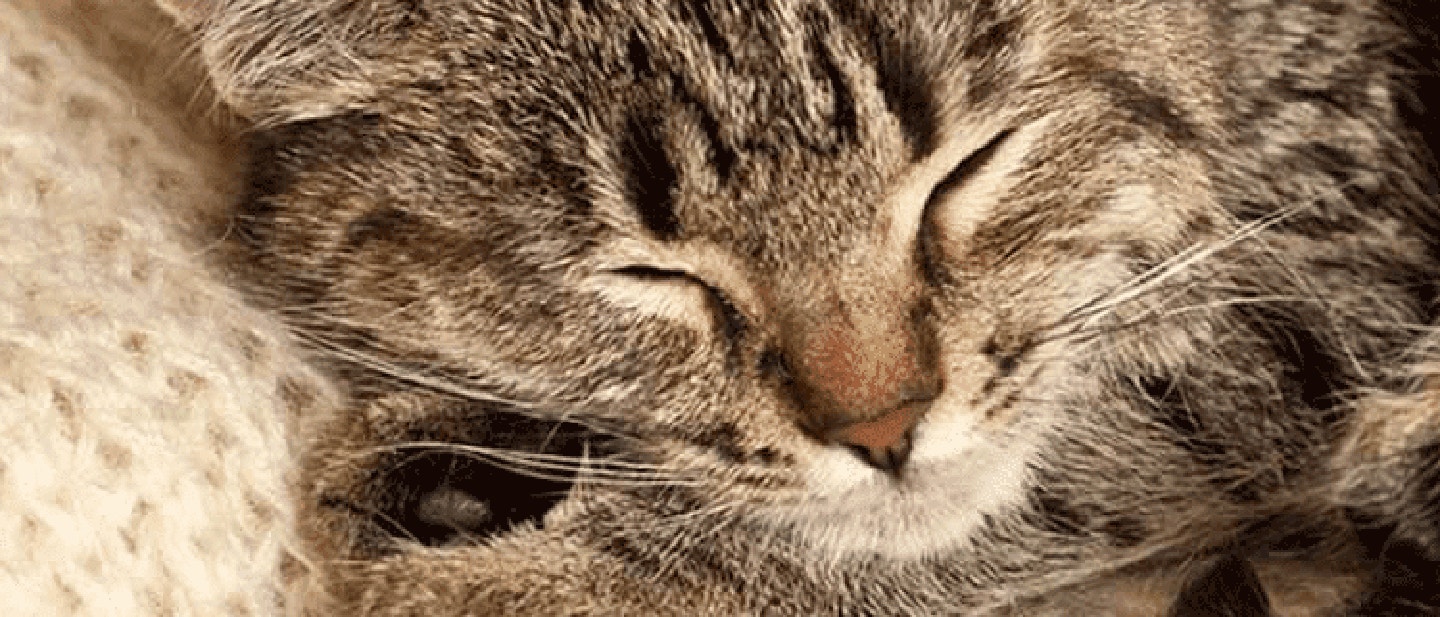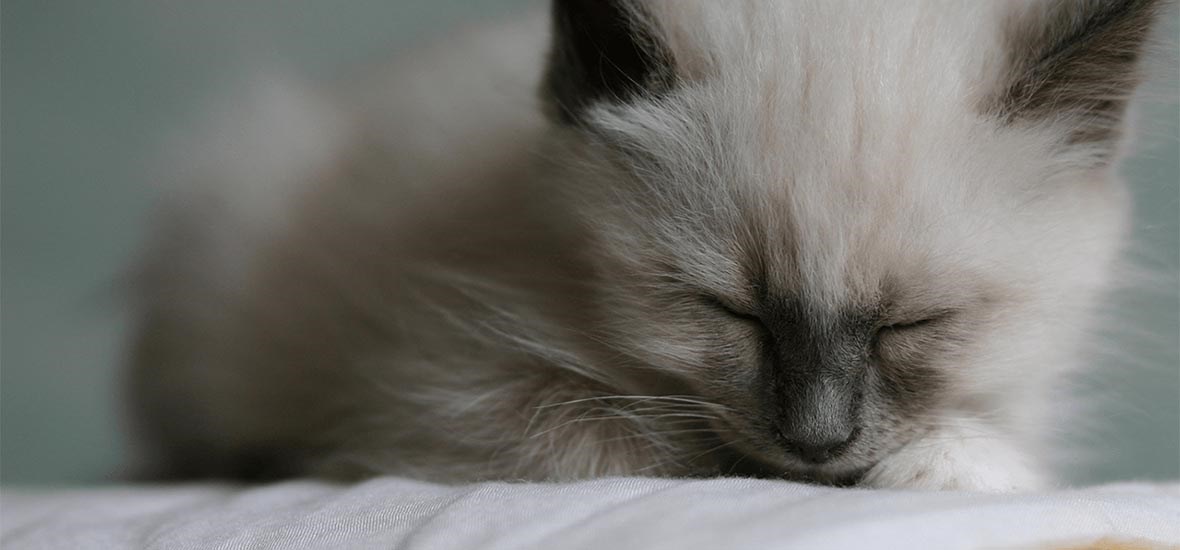
HOW LONG DO KITTENS SLEEP FOR?
Adult cats sleep an average of 18 hours a day - and kittens even more! If you have just welcomed a new kitten into your home, or if you are taking care of newborns, you are probably wondering how much they should sleep. It’s important for new pet owners to understand their kitten’s sleep behaviour. You may find your kitten sleeping all day and this is because they are. Kittens need to sleep often to grow and develop, process new information, and rest and recover as well.
How much kittens sleep can vary by age, activity level and breed. For instance, newborn kittens can sleep a lot, up to 22 hours a day, but by 6 months they may only need 16-20 hours. Kittens who are more active will need more rest after playtime, especially high-energy breeds like Abyssinian and Bengal cats.
A Guide to Kitten Sleeping Habits
You may find that your newborn kitten is sleeping all day, roughly around 22 hours. They wake up for short periods of time, have bursts of energy to play, explore and learn their environment, and then rest again. Kittens need to sleep often as they’re growing at a very fast rate in the early stages of their life. Between 2-6 months, once they’re more developed, they may sleep less, but still around 20 hours a day (or 18 hours on average). By 12 months, your cat will be napping around 15-18 hours a day.
Remember that growing and learning all this new information can be exhausting for kittens. Don’t worry if your kitten sleeps a lot throughout the day, as well as night. On the other hand, as they get older, it’s also natural for kittens and cats to be more active at dawn and dusk due to their hunting instincts. Check out our new kitten checklist to make sure you have everything your cat needs, from eating to playing to sleeping.
Newborn Kitten Sleeping Patterns and Behaviours
In the first week of their lives, your kitten can sleep more than 20 hours a day; this is around 90% of their time! Their sleep is light, and you may notice small and fast contractions of their face muscles and ears, as well as quiet noises. Your kitten is experiencing “rapid sleep”, sometimes referred to as paradoxical sleep or REM sleep (for Rapid Eye Movement). You may also notice that your newborn sleeps closely with their siblings and mother. At this point in their development, your kitten is not yet able to regulate their own body temperature, so sleeping this way is an instinct to keep themselves warm while also feeling protected. Your kitten may double in size within that first week, and such intense growing requires a lot of sleep and rest. Among other things, sleep allows your feline friend to reinforce their memorization and learning from the day.
Where Should My Kitten Sleep on the First Night?
Before you bring your kitten home, you should first prepare a sleeping area for them. You’ll want to make sure they feel comfortable and secure by choosing a quiet and safe place so your kitten can sleep for longer. This should be away from loud noises, such as washing machines, in an enclosed or hidden space, and preferably slightly off the ground. A raised sleeping area can help cats feel more secure as they can see their surroundings better. Both kittens and adult cats alike feel very cosy and safe in a cave-like bed, such as a cardboard box placed sideways and lined with blankets. Not only does this create a draught-free space, but it helps them feel secure that they can see what’s going on around them.
You should also make sure it's a warm space, since your kitten might be used to sleeping with their mother or siblings. Place blankets or use a cat bed to help your kitten feel cosy. Keep them in an area where they won’t be disturbed but can still observe their environment. On the first night, kittens should sleep in a crate or small room so they have everything they need in one space.

Kitten Sleeping Habits After Two Weeks
As your kitten grows older, they will gradually sleep less as they become more active; all of their senses are developing. Their sleep has a new deep phase (slow sleep or non-REM sleep) where they are totally relaxed and breathing slowly. This alternates with “light” REM sleep in a cycle called a “sleep bout”. Your kitten is becoming a cat and developing into a “polyphasic sleeper”, characterised by their sleeping time going into multiple bouts between waking phases.
At three weeks of age, your kitten will begin to sleep alone, with longer states of deep sleep. They will tend to sleep on their side or stomach. As they grow, they will become increasingly confident and start to explore their surroundings. Your little feline friend engages with their environment through jumping, climbing, pouncing, and scratching. These instinctive behaviours are very stimulating for your kitten and require a lot of energy, which needs to be restocked during sleep.
After two months, your kitten sleeps an average of 18 hours per day like an adult. Their sleep cycle could then split into a phase of sound sleep (20-25 minutes) followed by a phase of REM-paradoxical-dreaming (5 minutes). At this point, they will likely choose to sleep alone, often in warm, sunny, and comfortable places that are high off the ground.
Why Is My Kitten So Active At Night?
You may notice that your kitten curls up for a nap just as your household is waking up and starting the day. This is because cats are crepuscular mammals with a tendency to be most active at dawn and dusk. In the wild, felines hunt during those times and sleep during the day. Your little feline is still biologically programmed to do this. However, cats are also quite adaptable, especially if you are close to your feline friend. If they are waking you up at dawn, you can teach them not to do this by providing more activity during the day. You can make their daily environment more interactive by providing them with stimulating games. If they are more active in the day, they are likely to sleep more at night! Additionally, you could also try playing with them just before bedtime to tire them a little more. If they are an early riser, you could also provide them with a puzzle feeder, which is a toy filled with food, to keep them busy until you’ve had a chance to wake up and enjoy your coffee! You could also turn your home into a cat activity centre, so your cat can keep themselves entertained, as well as use up their energy.
How Long Does It Take to Tire a Kitten Out?
While cats are crepuscular animals, meaning they are more active at night than day, there are ways you can train your kitten. By making some changes to your schedule and including time for structured play, such as activities, exercise and training, you can help your cat be more active during the day. By relieving them of their pent-up energy, it can tire them out for the night. This can help if your cat is active at times that are inconvenient for you, making sure your kitten sleeps for longer when you need them to rest.
Kittens have extremely playful behaviours, so effective playtime is sure to tire them out. Find activities that are both stimulating and tiring. For instance, you could create obstacle courses around the house, use a laser pointer or wand, or a ping pong ball they can follow around. It also helps having climbing furniture so your kitten can climb and jump, as well as other dynamic games.
